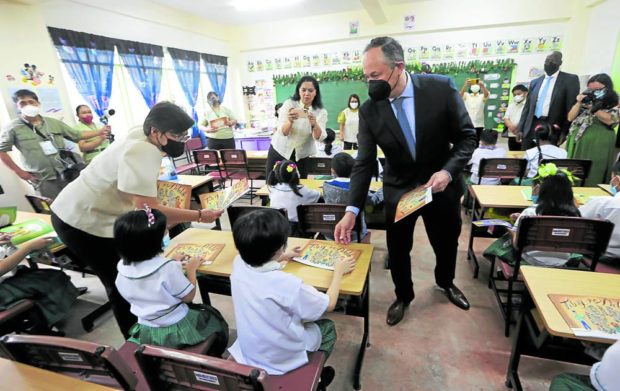$5 million from US to boost COVID vaccine rollout

HEALTH AID US | second gentleman Douglas Emhoff (right) and Department of Health officer in charge Maria Rosario Vergeire distribute “Tibay ng Dibdib” storybooks to students at Gregoria de Jesus Elementary School on Monday. The United States is donating $5 million to the Philippine government for its COVID vaccine rollout. (Photo by NIÑO JESUS ORBETA / Philippine Daily Inquirer)
MANILA, Philippines — The United States will provide an additional $5 million in funds in support for the COVID-19 vaccine rollout in the Philippines, US second gentleman Douglas Emhoff said on Monday.
He made the announcement during his visit to Gregoria de Jesus Elementary School in Caloocan City, where he was warmly welcomed by students waving Philippine and American flags from the corridor railings outside their classrooms.
Emhoff is in the country with his wife, US Vice President Kamala Harris, in her first visit to the Philippines and her trip in the region that is intended to strengthen US relations with its allies in Southeast Asia.
“I know schools have been virtual for over two years as the Philippines has fought so hard against this pandemic,” said Emhoff. “But it’s so good to see the children back here in school; I love it.”
The financial assistance, funded by the American Rescue Plan that provides emergency and relief funds and will be coursed through the US Agency for International Development (USAID), will support the nationwide vaccine distribution for children and adults in line with the Philippine government’s vaccination efforts.
Article continues after this advertisementUSAID also turned over hygiene kits and other COVID-19 supplies, which include thermal scanners, N-95 masks and oximeters.
Article continues after this advertisementSince the pandemic began, the United States has committed more than $51 million worth of funding for the Philippines’ COVID-19 response and more than 33 million doses of vaccines.
Department of Health (DOH) officer in charge Maria Rosario Vergeire, who was also present at the event, said that to date, the agency had administered 168 million doses of COVID-19 vaccines covering primary series and booster shots.
She said the government’s BidaPlus and Resbakuna campaigns were also implemented successfully through the assistance of USAID.
Tuberculosis treatment
In addition to the COVID-19 assistance, Emhoff noted that over the past decade, USAID has also provided $130 million in support of the Philippine government’s initiative to eliminate tuberculosis (TB).
“As a friend and as an ally, the United States is so proud to support the Philippines in its fight against the COVID-19 pandemic and tuberculosis,” he said.
At the height of the pandemic in 2020, USAID’s TB Platform assisted in the full implementation of Caloocan City’s local TB program through technical assistance, community engagement, and school-based learning.
In one classroom that Emhoff and Vergeire visited, they discussed with some students the “Tibay ng Dibdib” storybook, which is a health education learning material for elementary students.
The book is based on the true story of two young sisters from Norzagaray, Bulacan province, who survived TB through the help of their family, community, healthcare workers, and local government, emphasizing the whole-of-nation approach to address the disease.
The Department of Education, through the Office of Youth Affairs, plans to institutionalize this storybook initiative nationwide and the target launch would be this month, according to USAID.
“Our future lies in the brilliance of today’s children, which is why it is imperative that that same whole-of-society approach is maximized to transform our schools and communities into settings that make the healthy choice the easy choice for every Filipino child,” Vergerie said.
Highest in Asia
The World Health Organization’s global TB report in 2020 ranked the Philippines as having the highest TB incidence rate in Asia, with 554 TB cases for every 100,000 Filipinos.
The health body said over 20,000 Filipinos may die of TB every year in the next five years if TB services that were disrupted because of mobility restrictions brought about by COVID-19 are not brought back in public health services such as consultation, testing, and treatment.
TB is caused by Mycobacterium tuberculosis, which is passed on from a person infected with the TB bacteria through coughing, sneezing, spitting, and talking.
The bacteria are also expelled in respiratory droplets and an infected person’s close contact may inhale the bacteria, which attacks the lungs and other vital parts of the body.
Although TB is preventable and curable, there is still a stigma associated with the disease, the DOH said. Part of the agency’s TB program is to educate the public about preventing deaths and possible outbreaks through early detection and treatment.
COVID cases declining
Meanwhile, the DOH said COVID-19 cases declined to an average daily 1,143 cases during the past week, which is 12 percent lower from the nearly 1,300 average daily cases the previous week.
Out of the 8,004 people who tested positive in laboratory tests from Nov. 14 to Nov. 20, two were in severe or critical condition.
To date, 18,647 individuals remain infected with the virus, including 568 patients admitted in hospitals who are either severely or critically ill.
The DOH also confirmed 93 more deaths due to COVID-19, around half of which occurred in 2020 or 2021. This raised the official death toll to 64,476 out of 4 million confirmed cases.
Official data also showed further improvement in healthcare utilization rate, or the percentage of allocated beds for COVID-19 patients that are in use.
The DOH said 493 or 20.9 percent of COVID-19 intensive care unit (ICU) beds, and 4,796 or 23.1 percent of COVID-19 non-ICU beds are in use.
So far, 73.7 million individuals in the country have been fully vaccinated against COVID-19. This is 94.38 percent of the government’s target to protect at least 78.1 million individuals with the complete primary dose of COVID-19 vaccines.
However, only 20.86 million individuals have availed themselves of boosters or additional doses.